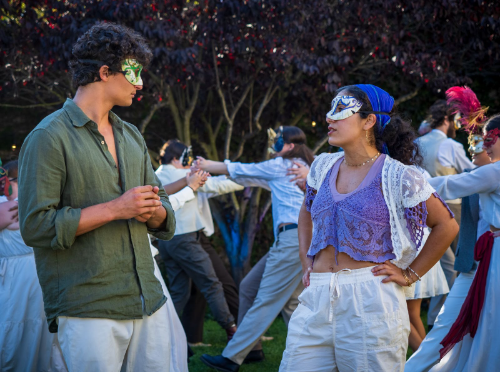
Alice Dehghanzadeh
Contributing Writer
Shakespeare’s timeless comedy, “Much Ado About Nothing,” was revitalized once more by Naked Shakes, a theater program run by Irwin Appel, involving students and faculty on campus. From Oct. 11 to Oct. 13, the sharp wit, innovative storytelling, and emotional depth of the play was brilliantly brought to life. While incorporating the original themes of love, deception, and reputation, Director Irwin Appel’s vision for the reimagining of “Much Ado About Nothing” involves clever, creative choices that made for a wonderful viewing experience.
Actor and faculty member Sean O’Shea discussed with me his experience as Leonato, father to the character Hero and Governor of Messina. Having performed “Much Ado About Nothing” thrice, O’Shea shared that the way he breaks apart his characters to better understand them is by scoring the play “like a musical piece” through the analysis of punctuation and rhythm, making sure to align with the director’s intentions too. He described the play as a delicate balance: “If something was taken in another direction, it could have easily been a tragedy or a drama” instead of a rom-com. When I questioned him about the complexity of Shakespearean language, he shared that the iambic pentameter of the play enhances understanding since it is most logical to how we speak, and that “people mistakenly heighten it and keep it from being natural.” O’Shea also claimed that actually understanding what you’re saying in the performance instead of routine memorization allows one to focus on the energy and drive of the character. Rodolphe Le Feuvre, who played one of the main characters, Benedick, stated that the language is worth listening to, as it’s “poetry” and “well-spoken” and therefore can help “the audience understand the images that the character is fighting to portray to make him/herself understood.” He also claimed that it’s easier to understand Shakespearean language when the characters are “saying what they’re thinking.”
When discussing the cast’s chemistry, O’Shea revealed that the director emphasized showing the ensemble as a cohesive unit, rather than a hierarchy. This ensures that those with less lines remain an integral piece, so everyone feels heard, valued, and appreciated. O’Shea pointed out that the cast’s energy came alive in scenes with audience interaction, such as when Benedick and Beatrice wove in between the audience’s seating to hide themselves from other characters. The engaged response from the audience only enhanced the actors’ performances. Le Feuvre remarked, “it’s all about communication,” and knowing Sara Sadjadi, who played Beatrice, helped develop the dynamic between their two characters.
As a father himself, O’Shea drew on personal experience in order to play Leonato, while blending it with the historical traditional values. This is especially seen in the wedding scene when hearing the information about his daughter Hero’s supposed, and later proven false, disloyalty. Appel helped him channel an intense anger to replicate the value of familial honor and reputation of the past, which may not resonate as clearly with a contemporary audience. As a result, O’Shea skillfully portrayed the overwhelming devastation felt by Leonato, bringing a combination of raw intensity mixed with the historical context of the play. Le Feuvre similarly used his personal experience to enhance his performance in the play, specifically as someone who was “a fervent fighter against ever dating” until he “fell in love a year ago.”
I also had the pleasure of getting to know the band; when asked about the process of collaborating with the cast and director to integrate music into the performance, Matt Perko, the drummer, shared with The Bottom Line that since the band only started rehearsing late in the process, they “had to learn the flow of the show and the different timings dictated by the acting.” There were instances where they had to adapt their music to fit the length of a scene, and moments where the actors and band members were learning to meet in the middle with their respective performances.
Perko also mentioned that since the play is an effective integration of comedic and dramatic instances, the goal of music was to heighten the emotion and “add an additional layer” that “help[ed] communicate those feelings.” The refreshing musical interruptions only strengthened the scene, especially with associations to the characters themselves, like when the jazzy “Beatrice” written by Sam Rivers hummed as our play’s Beatrice was performing a touching soliloquy, or when the infamous ballad “I Fall In Love Too Easily” by Frank Sinatra and Chet Baker drifted in after characters Benedick and Beatrice expressed their love for one another.
This is Naked Shakes’ 19th year in production, and their expertise shines through to create a creative and masterful retelling of Shakespeare’s timeless comedy, “Much Ado About Nothing.” Appel’s focus on unity within the cast presented them as a strong team whose goals were perfectly met. The dynamic performance was heightened by the presence of music that brought emotional depth to the Shakespearean language that the actors worked hard to weave through. Together, the backstage crew, cast, and musicians delivered a production that not only entertained, but left the audience with a more educated stance on the brilliance of Shakespeare’s work.










